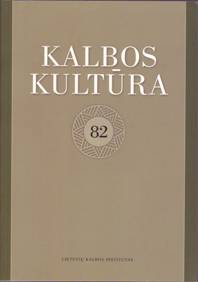Dėl dar vienos lietuvių pavardžių atsiradimo galimybės
On another hypothetical origin of Lithuanian surnames
Author(s): Vitalija MaciejauskienėSubject(s): Baltic Languages
Published by: Lietuvių Kalbos Institutas
Summary/Abstract: The paper attempts to provide arguments for one more hypothetical claim concerning the foreign origin and Slavic structure of some Lithuanian surnames. They include surnames with the suffixes of the -sk- type and the suffixes -avičius, -evičius. Such surnames are numerous; some of them are among the most frequent. They are not limited to particular territories and are found throughout the country. They look universal and are also frequent in Slavic languages (Byelorussian, Polish and Russian) outside Lithuania.In Lithuanian anthroponymic research such surnames have been treated as resulting from Slavic influence on Lithuanian names or as borrowings from Slavic languages. However, it is also admitted that the surnames with the suffixes -avičius, -evičius might have evolved rather naturally. In the 16th century and later due to a specific linguistic situation in the Lithuanian State patronymics with such suffixes were quite frequent. Still such circumstances of the evolution of the names do not seem sufficient; they fail to account for a large number of such names in the Lithuanian onomastics and their highly frequent use.The anthroponymic research into the 19th century names and surnames identified a peculiarity of referring to people by their names and two surnames joined by the words arba, kitaip (‘or’, ‘otherwise’), e.g. Jacobi Wadil alias Rutkowʃki, Maciey Wersocki alias Szykszna, Thomas Pietkiewicz alias Smeledis. The analysis of the structure and origin of such pairs, their identification with the present surnames, especially considering the historic and present-day data referring to the spread of personal names, helped establish which of the two surnames were later preserved as an official surname.The investigation has also contributed to formulating one more hypothetical claim concerning surnames of foreign origin with Slavic suffixes (-sk- type and -avičius, -evičius). Such surnames might have artificially replaced Lithuanian surnames which had already had a well-established Lithuanian structure (often they were also of Lithuanian origin). This would be another, previously not identified, indication of the development of Lithuanian surnames under the influence of Slavic languages.
Journal: Bendrinė kalba (iki 2014 metų – Kalbos kultūra)
- Issue Year: 2009
- Issue No: 82
- Page Range: 9-26
- Page Count: 18
- Language: Lithuanian

